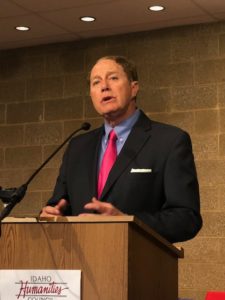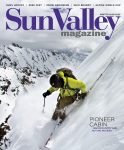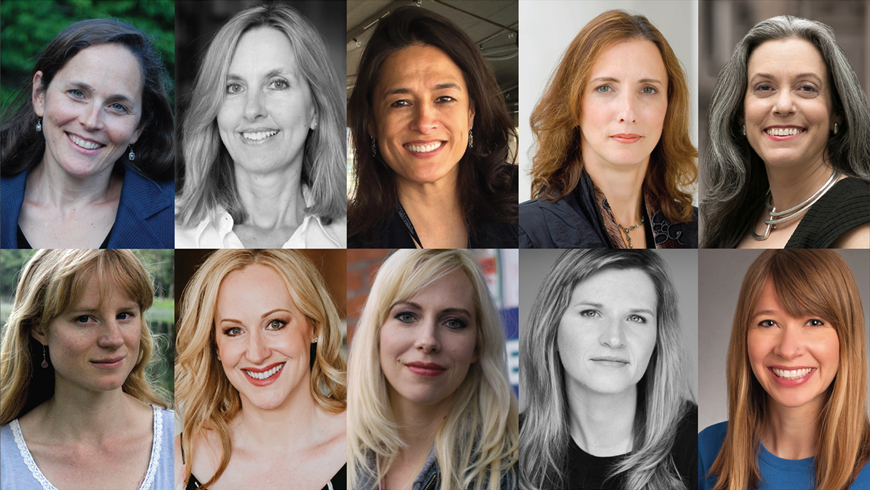When did you find your voice? Was it a particular moment or chapter in your life? Was it a challenge or easy? What does your voice sound like? Is it strong, or do you hide it? Do you even know you have a voice?
For most of us, developing a voice requires courage and time and can be a journey fraught with growing pains. When we do share our stories about our experiences, however, we often find unexpected commonalities that give us the strength to persevere. And when we have examples of others using their voices and telling us that ours matters, it helps facilitate personal development.
The Wood River Valley is fortunate to welcome an exceptional cast of America’s finest voices—writers and thinkers—to the Alturas Institute’s fourth annual “Conversations with Exceptional Women” to discuss the theme: “Finding Her Voice.” The event will be held in partnership with The Community Library, Sept. 27-28, in the lecture hall of the Ketchum library.
David Adler, president of the Alturas Institute, said this theme “captures what women have been striving for for so long, especially in this era of the #MeToo movement and the growing solidarity of women coming forward to speak truth to power.”

David Adler, President of the Alturas Institute
But this forum is far more than a pump-up lecture on how to empower oneself. These conversations—with Jody Williams, Diane McWhorter, Tara Westover, Joanne Freeman, Emily Ruskovich, Gina Bennett, Caroline Heldman, and Carole Geithner—are meant to be natural and fluid. Speakers are told not to prepare remarks. There are no lectures by design, so that the audience and speakers can connect and have genuine, heartfelt dialogue.
Adler shared that audience members have witnessed “profound revelations” over the years. Kiki Tidwell, president of the Tidwell Idaho Foundation and attendee at past “Conversations,” revels in the thrill of watching speakers “reach resolutions in real time in front of us.” She recalled one conversation in which a speaker decided to challenge the gold medals awarded to doping athletes she competed against in the Olympics. Tidwell also spoke to the incredible opportunity these conversations offer for real face time with America’s top minds and hearts. “I spend a big chunk of the year in Silicon Valley to have access to top-level people; these conversations brought them right here to me in my Idaho hometown.”
And that’s exactly the idea. Adler and his diverse team of board members from across the country started the Alturas Institute four years ago to prove that “great dialogue with women can happen outside of major cities.” In creating a magnetic ecosystem focused on “advancing the Constitution, civic duty, and gender equality” in the “reddest of red states,” Adler said the organization’s goal is to promote these topics not only in Idaho but across the nation. And it has worked. Based in Idaho Falls, the Alturas Institute holds similar conversations around the state that quickly sell out. “I don’t like the idea of ceilings in life,” Adler said. “The whole country is so interconnected. The dialogue that is ignited in Sun Valley can spark conversation elsewhere.”
So what makes these women and conversations exceptional? Adler said that while these women have “enjoyed tremendous achievements in their own sector, they are unpretentious and remarkable, professionally and personally.” Adler noted that “the speakers relate so well to the women in the audience, and the conversations are not hierarchical. When a woman in the audience rises to ask a question, it’s like she’s asking it to a neighbor.” He also noted that audience members leave feeling empowered because they realize the women on the stage “have endured similar problems, and they see how these women have worked through their challenges. It’s reaffirming to know they are not alone.”
Though many of of the speakers have heard of each other, this is the first time many of them will meet, and they understand the power of gathering with other women to discuss relevant topics. Williams, a Nobel Peace Prize recipient for her work to ban land mines, noted: “The power of women working together never ceases to amaze me. So, these conversations seem like a natural fit.”
Heldman, associate professor of politics at Occidental College in Los Angeles and co-founder of End Rape on Campus, sees the conversations as an opportunity to form bonds and collaborate with other women “who have worked their way to the top of their fields.” As proof, she recalled that “a group of women from past ‘Conversations with Exceptional Women’ created the Women’s Media Summit that now hosts a popular annual meeting on the subject.” Real advancement and positive connection naturally follows this event.
“Conversations with Exceptional Women” is truly an opportunity to connect on equal footing with incredible women whose stories resonate with our own. When asked when she found her voice, Heldman responded that it was when she was less than a year old, singing “Hallelujah.” For Williams, it involved an accumulation of experiences of standing up for others: for her handicapped brother, to bullies in grade school, and protesting the Vietnam War. And as speaker Elizabeth Gutting reflected, “I think finding my voice has been, and will continue to be, an ongoing process.”


